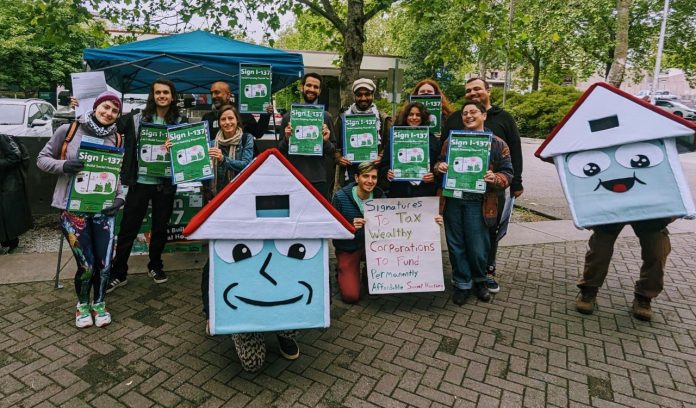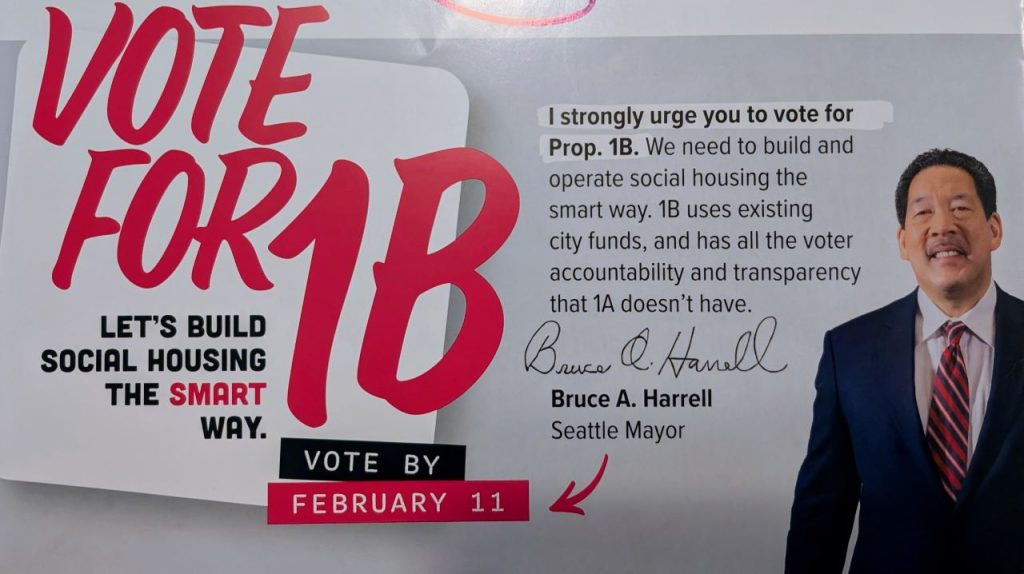
Social housing advocates are declaring victory after election night results showed grassroots Proposition 1A leading by a 15-point margin. The Urbanist endorsed Proposition 1A, which faced off against Prop 1B after the Seattle City Council put the competing measure on the ballot at the behest of the Seattle Metropolitan Chamber of Commerce. The chamber also drafted the competing language and funded the campaign behind it.
Proposition 1A would tax businesses on top salaries, raising approximately $53 million annually for social housing via a 5% tax on individual compensation exceeding $1 million annually. Companies who do not compensate individual employees more than $1 million annually would not be subject to the tax. The chamber-backed alternative would repurpose existing Jumpstart payroll tax funds, which are largely dedicated to affordable housing already — just as City leaders did to patch a budget hole and fund their new priorities without raising taxes last fall.
More than two thirds of voters backed the first Proposition 1 question of whether to fund the Seattle Social Housing Developer via either mechanism.
On the second question of which funding source to use, nearly 58% of voters wanted to enact the new tax, while 42% wanted to use preexisting funding, based on election night results. Update: Prop 1A increased its share to 58.2% in Wednesday’s ballot drop, pushing its lead to 16.5 points .
As typical with Washington’s vote-by-mail system, thousands of ballots remain to be counted as election officials catch up with returns that came in close to the end of the voting period, which ended at 8pm Tuesday. However, the sizable lead that Prop 1A opened up on election night appears safe.
The mood appeared jubilant at Wild Rose in Capitol Hill, where House Our Neighbors, the grassroots advocacy group behind Prop 1A, gathered supporters to celebrate crossing the finishing line.
Scenes from the Prop 1A party
— Guy Oron (@guyoron.net) February 11, 2025 at 8:16 PM
[image or embed]
“In the face of an opposition that spent half a million dollars in 20 days, and a majority City Council and Mayor who did what they could to confuse and mislead voters, [l]ast night, the votes for Prop 1A were decisive,” House Our Neighbors wrote in a statement. “Seattleites want to tax the wealthiest businesses to fund permanently affordable social housing. For a wide range of incomes. For a second time Seattle said, loud and clear, that we want social housing!”
House Our Neighbors said they expected a legal challenge and for the issue to remain salient in mayoral and city council races.
“We now await a potential legal challenge from the 1B opposition,” House Our Neighbors continued. “Because let’s be clear, their opposition was never about any of the issues they raised, it was about making sure the wealthiest among us don’t pay a dollar more in taxes to solve the housing crisis. With two citywide seats and a Mayoral election coming up, candidates should take heed.”
Seattle advocates are set to get their chance to try out the mixed-income social housing model they’ve promoted, which has proven successful in places like Montgomery County, Maryland and Vienna, Austria. Unlike traditional affordable housing, buildings would include both middle-income homes and low-income homes, with the higher rents subsidizing the low-income units offered at lower rents. Advocates hopes this cross subsidy helps defray operating costs and even serves as a funding source for further social housing creation.
While the social housing coalition is celebrating, the election result was a major setback for the centrist coalition that currently governs Seattle.

Seattle Mayor Bruce Harrell endorsed Prop 1B and appeared prominently on the campaign literature that the campaign sent out. The centrist majority led by Council President Sara Nelson put Prop 1B on the ballot and pushed the vote to a low-turnout February special election instead of the high-turnout November election advocates sought. Fueled by large donations from Amazon, Microsoft, and the chamber, the campaign behind Prop 1B outspent social housing advocates by more than a two-to-one margin.
All those efforts could not sway Seattle voters, who also passed two property tax levies for Seattle Public Schools on the same ballot.
Relatedly, recent polling from Northwest Progressive Institute and Change Research indicates that the Harrell’s approval ratings have tanked and any Seattle councilmember not named Alexis Mercedes Rinck is unpopular with voters, too. Frustration with delay tactics and the lack of progress on housing solutions could well be part of that sinking approval, and it appears voters are ready to make an end around of elected leaders, if necessary, given the reluctance to go big on housing.
Going big on housing will also entail passing a Seattle Comprehensive Plan that adds far more housing opportunities across the city, rezoning areas with restrictive low-density zoning incompatible with social housing and affordability, generally. That plan is already past due, despite it presenting a ripe opportunity to boost housing production, which most policymakers have agreed is an urgent priority. A few centrist Seattle councilmembers have already signaled intent to scale back the mayor’s plan and delay changes, which already scaled back the proposal from his own planning department.
In their haste to appeal to the proverbial homevoter, Seattle officials may be getting sideways with the actual median voter in this city, who appears far more pro-housing and willing to tax the rich to fund housing.
Harrell, Nelson, and Rinck face reelection fights this fall, and all three have declared their intent to run for another term.
Tuesday’s results were also favorable in Burien, where a measure raising the minimum wage won 54% of the vote and appeared on course to pass. The ballot measure was backed by the Transit Riders Union and endorsed by The Urbanist. Similar to Seattle, the majority of the Burien City Council sought to sabotage the effort by writing a watered down measure into law and campaigning against the grassroots measure.
Update: This piece was updated around 11:30am Wednesday with the statement from House Our Neighbors.
Doug Trumm is publisher of The Urbanist. An Urbanist writer since 2015, he dreams of pedestrian streets, bus lanes, and a mass-timber building spree to end our housing crisis. He graduated from the Evans School of Public Policy and Governance at the University of Washington in 2019. He lives in Seattle's Fremont neighborhood and loves to explore the city by foot and by bike.

